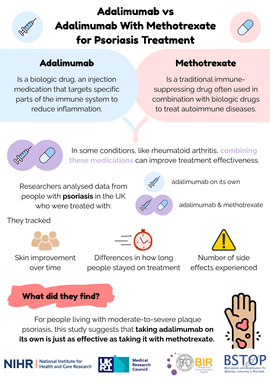03 September 2025
New Lay Summary - No evidence for higher effectiveness of adalimumab and methotrexate combined therapy in psoriasis
Does adding methotrexate to adalimumab enhance the effectiveness and persistence of adalimumab for treating plaque psoriasis in adults? A new lay summary is available to read below.
What did the researchers do?
They studied whether combining two medicines – adalimumab and methotrexate – would lead to better treatment outcomes in people with moderate-to-severe plaque psoriasis. Adalimumab is a commonly used biologic therapy that targets inflammation, while methotrexate is a traditional immune-suppressing drug that is often used in combination with biologic drugs in other autoimmune diseases like rheumatoid arthritis. In those conditions, combination therapy has been shown to improve treatment effectiveness and reduce the chances of the body developing resistance to the biologic drug. However, there is limited evidence to support this approach in psoriasis.
To find out more, researchers analysed data from people with psoriasis in the UK who had recently started treatment with adalimumab, either alone or together with methotrexate. They tracked how well skin symptoms improved over time and whether there were any differences in how long people stayed on treatment or in the number of side effects experienced.
What did the researchers find?
They found that adding methotrexate to adalimumab did not lead to significantly better outcomes. Both groups – those on adalimumab alone and those on combination therapy – showed similar improvements in skin clearance over time. There were also no meaningful differences in how long people remained on treatment (known as drug survival), nor in how often treatment was discontinued. Side effects appeared similar across both groups.
This suggests that, unlike in some other immune conditions, methotrexate does not seem to enhance the effectiveness of adalimumab in psoriasis. The results were consistent across different measures of skin improvement and were based on real-world clinical practice, not just clinical trials.
What does this mean for people with psoriasis?
For people living with moderate-to-severe plaque psoriasis, this study suggests that taking adalimumab on its own is just as effective as taking it with methotrexate. This is important because methotrexate can carry additional risks, such as liver toxicity or the need for regular blood monitoring, and some people may find it difficult to tolerate.
The findings offer reassurance that most people with psoriasis can benefit from biologic treatment with adalimumab without needing to add another drug. This simplifies treatment, potentially reduces the risk of side effects, and lessens the burden of taking multiple medications. However, everyone responds differently, and treatment should always be tailored to each individual. Some patients may still benefit from combination therapy based on their personal circumstances, and decisions should be made together with a healthcare provider.
The full paper is available to read online at: https://doi.org/10.1001/jamadermatol.2025.1463
Written by Zenas Yiu
